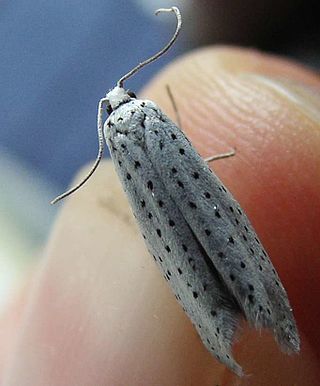Related Research Articles
Sir George Francis Hampson, 10th Baronet was an English entomologist.

Doidae is a small family of Lepidoptera with an exclusively New World distribution, with species occurring in Central America, the south-western United States, and northern South America.

Urodidae, whose species are commonly known as false burnet moths, is a family of moths in the lepidopteran order. It is the type genus in the superfamily, Urodoidea, with three genera, one of which, Wockia, occurs in Europe.
Metachanda is the sole genus in tribe Metachandini of moth subfamily Oecophorinae. Metachandini was originally described as family Metachandidae by Edward Meyrick in 1911, and at the time also contained the genus Chanystis, which is currently unplaced to tribe within Oecophorinae. It has also previously been described as tribe Metachandini of subfamily Gelechiinae.
Agathiphaga is a genus of moths, known as kauri moths. and is the only living genus in the family Agathiphagidae. This caddisfly-like lineage of primitive moths was first reported by Lionel Jack Dumbleton in 1952, as a new genus of Micropterigidae.
Herbert Druce, FLS was an English entomologist. His collections were acquired by Frederick DuCane Godman (1834–1919), Osbert Salvin (1835–1898), and James John Joicey (1870–1932) before being bequeathed to the Natural History Museum in London.

Sematurinae is a subfamily of moths in the family Sematuridae represented by at least 29 species in the Neotropics.

Yponomeutinae is a subfamily of "micromoths" in the lepidopteran family Yponomeutidae. As their scientific name implies, this is the subfamily containing the type genus of the ermine moths, Yponomeuta. The subfamily has worldwide distribution.

George Talbot FES was an English entomologist who specialised in butterflies. He wrote about 150 scientific papers, the majority being primarily systematic, consisting of the description of new species or the revision of various genera. He was also responsible for the curation and preservation of the Joicey collection of Lepidoptera prior to its accession by the Natural History Museum.

The Thyatirinae, or false owlet moths, are a subfamily of the moth family Drepanidae with about 200 species described. Until recently, most classifications treated this group as a separate family called Thyatiridae.
Prosopidia is a genus of moths in the subfamily Arctiinae.

Diphtherinae is a monotypic subfamily of moths in the family Nolidae erected by Michael Fibiger and J. Donald Lafontaine in 2005. Its only genus, Diphthera, was erected by Jacob Hübner in 1809. The genus was moved from Noctuidae in 2013 after the phylogenetic analysis of Reza Zahiri et al. (2013).
Celonoptera is a monotypic moth genus in the family Geometridae. Its only species, Celonoptera mirificaria, is found in south-eastern Europe. Both the genus and species were first described by Julius Lederer in 1862.
Victor Gurney Logan Van Someren was a zoologist and entomologist. Van Someren was born in Australia. He attended George Watson's College and studied zoology at University of Edinburgh. He was also a dentist. Van Someren moved to Kenya in 1912 and lived in Nairobi. He was in the East Africa and Uganda Natural History Society and became Honorary Secretary. In 1930 he became Curator of the Coryndon Museum. Van Someren named a number of bird and butterfly species.

Cyme sexualis is a moth of the subfamily Arctiinae first described by Felder in 1864. It is found on Ambon, Sulawesi, the Dampier Archipelago. and in New Guinea.

Thermozephyrus ataxus, the wonderful hairstreak, is a small butterfly found from India to Japan that belongs to the lycaenids or blues family.
Prosopidia morosa is a moth in the subfamily Arctiinae. It was described by William Schaus in 1910. It is found in Costa Rica.

The genus Mania comprises a group of tropical and semi-tropical New World moths in the family Sematuridae. The genus has historically been referred to as either Nothus or Sematura, but both of these names are invalid.
References
- ↑ Beccaloni, G.; Scoble, M.; Kitching, I.; Simonsen, T.; Robinson, G.; Pitkin, B.; Hine, A.; Lyal, C., eds. (2003). "Prosopidia meruloides". The Global Lepidoptera Names Index . Natural History Museum . Retrieved May 12, 2018.